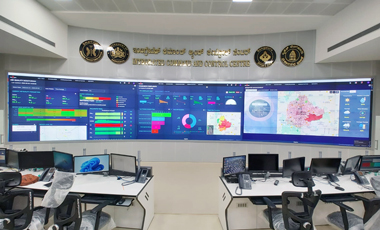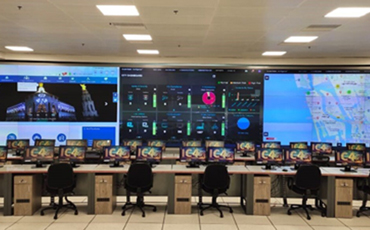Background
The Ministry of Municipal and Rural Affairs and Housing (MoMRAH) in the Kingdom of Saudi Arabia embarked on a transformative journey to modernize urban governance through the National Command Control Centre (NCCC) – the Golden Amanah Pilot Project. The initiative aimed to streamline operations, foster inter-ministerial collaboration, and improve service delivery for millions of citizens.
Business Challenges
Before the project’s implementation, MoMRAH faced several pressing challenges:
- Fragmented Decision Support: There was a lack of cross-directional and functional symbiosis among ministries, resulting in siloed decision-making.
- Limited Service Management: Insufficient focus on managing city services hampered efficiency.
- Poor Coordination: Collaboration and coordination gaps among Amanahs and Urban Local Bodies (ULBs) hindered cohesive governance.
- Manual Governance Processes: An absence of automated rules and business policy configurations made managing processes labor-intensive and error-prone.
- COVID-19 Monitoring: There were inadequate mechanisms to monitor compliance with COVID-19 protocols.
- Innovation Demands: There was an increasing need for innovation-centric development to keep up with urban growth.
- Manual City Operations: Critical city functions, including policy governance, health, safety, and transport, relied heavily on manual interventions.
- Sustainability Issues: High energy consumption and reliance on degenerative energy sources raised sustainability concerns.
- Data Gaps: A lack of data-driven project and program monitoring limited MoMRAH’s ability to respond in real time.
Solution Delivered
To address these complex challenges, Fluentgrid’s digital city solutions empowered MoMRAH with:
- Seamless Interoperability: Integrated systems facilitated interoperability among diverse teams and departments.
- Improved User Experience: Streamlined digital services significantly improved efficiency for administrators and citizens alike.
- Multi-Channel Citizen Engagement: Citizens could now engage anytime, anywhere, through multiple digital channels.
- Mobile-Enabled Field Force: Field teams were equipped with mobile tools to manage incidents more effectively.
- Data Fusion: IT and OT systems were integrated for real-time data visualization, enabling instant situational awareness.
Impact
The National Command Control Centre delivered measurable results:
- Enhanced cross-functional collaboration between ministries, Amanahs, and ULBs
- Elevated user experience and administrative efficiency
- 24/7 citizen engagement through accessible, digital channels
- Improved on-ground incident management through a mobile-enabled workforce
- Real-time data visualization that strengthened decision-making at all levels
Conclusion
The Golden Amanah Pilot Project has set a benchmark for digital governance in the Kingdom of Saudi Arabia. Serving a population of 36 Million, MoMRAH has addressed systemic challenges with an integrated, automated, and citizen-centric approach. This initiative has not only improved governance but also laid a strong foundation for smart, sustainable cities of the future.











